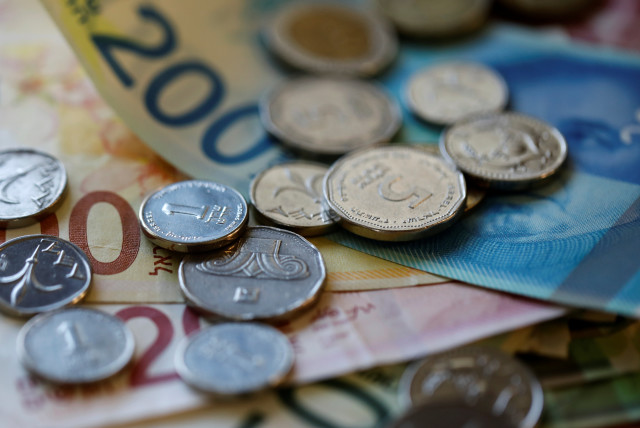Bank of Israel raises interest rate to 4.75%, highest since 2006

Despite the rate hikes, Israel's inflation rate stood at 5% in April, near a 14-year high and well above the government's 1%-3% annual target range.
The Bank of Israel on Monday raised the interest rate 0.25% to 4.75% in an effort to curb inflation. The tenth consecutive hike in just over a year brought the interest rate to its highest level since 2006.The decision to raise interest rates came as inflation in Israel continues to soar, with some slight easing but little sign of a halt. Various components of the Consumer Price Index have experienced significant inflationary pressures, indicating a need for urgent action. Last month, the central bank raised the interest rate 0.25% to 4.50%.“Economic activity in Israel is at a high level and is accompanied by a tight labor market, although there is some moderation in a number of indicators,” the Bank of Israel said in a statement. “Inflation is broad and remains high. Therefore, the Monetary Committee decided to increase the interest rate. The interest rate path will be determined in accordance with activity data and the development of inflation to continue supporting the attainment of the policy goal.”The Bank of Israel said inflation in Israel over the last year, at 5%, was well over its 1%-3% target range, although the rate of growth is lower than last year.
“Looking at the past six months, and even more so over the past three months, the pace of inflation is lower than the year-on-year inflation,” it said. “Inflation expectations and forecasts for the first year from all sources are around the upper bound of the target range. Expectations derived from the capital market for the second year onward are all within the target range.”Israel’s economy was still performing well, despite its inflationary issues, the central bank said.“Economic activity in Israel remains strong, but some economic indicators point to a moderation in activity,” it said. “GDP grew by 2.5% in annual terms in the first quarter, a relatively high pace once the temporary effects of changes in vehicle taxation are omitted. The labor market remains tight and in a full-employment environment, but the job-vacancy rate is in a downward trend.”While the central bank’s rate hikes are intended to stabilize the economy, they also affect thousands of mortgage holders.
OECD report on Israeli economy advises Bank of Israel to be cautious
On Sunday, Bank Hapoalim said it would try to absorb the interest-rate increase for one year in an effort to protect its customers from the financial burden. Hapoalim made a similar move in January.Prior to Monday’s interest-rate announcement, Dubi Amitai, head of the Israeli Presidency of Business Organizations, citing what he said were a lack of growth engines in the state budget, made an urgent appeal to the chairman of the central bank’s Monetary Committee.“It’s time for you to wake up – there should be an urgent discussion in the committee on the causes of inflation and the lack of government activity in curbing it,” he said.“Unfortunately, the data regarding the growth of the Israeli economy, as well as the inflation levels, are overwhelmingly skewed to the negative side,” Amitai said. “I call on the Israeli government to wake up from its slumber and join the governor of the Bank of Israel, who remains alone in the fight against inflation.”The Organization for Economic Cooperation and Development (OECD) report on Israel’s economy, which was released last month, advised caution on the part of the Bank of Israel. It emphasized the need to maintain a tight monetary policy stance due to inflation exceeding the target range and robust domestic demand. It also highlighted the bank’s intention to determine the pace of future interest-rate hikes based on inflation and activity developments.The OECD report suggested that if underlying inflationary pressures become more pronounced, the central bank may consider actively reducing its balance sheet in conjunction with further rate increases. This indicates the bank’s willingness to employ various strategies to tackle rising inflation effectively.The impact of these interest-rate hikes on the overall economy remains a topic of concern and debate among experts. As mortgage repayments become more burdensome, households may face additional financial stress. The Bank of Israel will need to carefully monitor the situation, ensuring that its actions strike the right balance between combating inflation and supporting economic stability.As the central bank maintains its firm stance against rising inflation, it remains to be seen whether its measures yield the desired results and restore economic equilibrium.
Jerusalem Post Store
`; document.getElementById("linkPremium").innerHTML = cont; var divWithLink = document.getElementById("premium-link"); if (divWithLink !== null && divWithLink !== 'undefined') { divWithLink.style.border = "solid 1px #cb0f3e"; divWithLink.style.textAlign = "center"; divWithLink.style.marginBottom = "15px"; divWithLink.style.marginTop = "15px"; divWithLink.style.width = "100%"; divWithLink.style.backgroundColor = "#122952"; divWithLink.style.color = "#ffffff"; divWithLink.style.lineHeight = "1.5"; } } (function (v, i) { });


